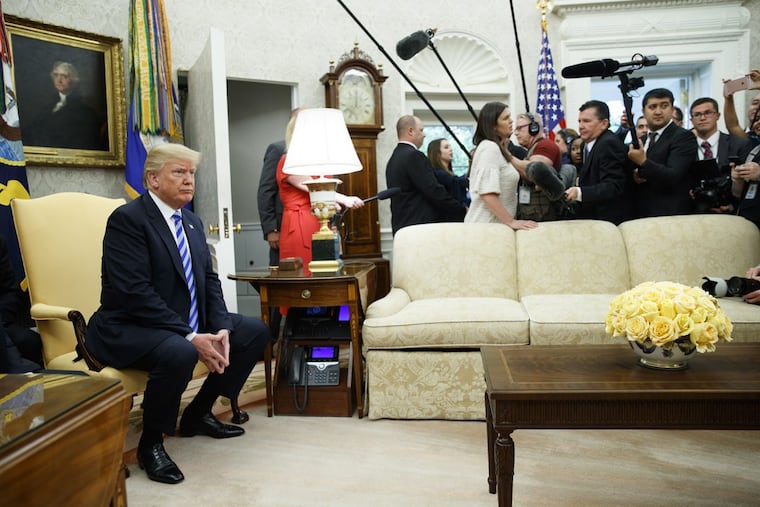Robert Mueller's investigation into Trump hits one-year mark with slew of new details
Thursday marks the one-year anniversary of special counsel Robert Mueller's investigation into Russian interference in the 2016 election.

Thursday marked the one-year anniversary of special counsel Robert Mueller's investigation into Russian interference in the 2016 election, including allegations of collusion between President Trump's campaign and Moscow, something the president has repeatedly denied.
In the 365 days that have passed since Mueller was appointed as special counsel by now embattled Deputy Attorney General Rod Rosenstein (due to Attorney General Jeff Sessions' recusal), 19 people and three businesses have been charged, and five people have pleaded guilty — including former national security adviser Michael Flynn, campaign aide Rick Gates, and campaign adviser George Papadopoulos.
Over the last 24 hours, a number of news stories have provided new details about Mueller's investigation, which, despite claims by new Trump lawyer Rudy Giuliani, doesn't appear to be ending anytime soon. Here's the latest:
New York Times outlines the origin of Mueller’s investigation
Adam Goldman, a Pulitzer Prize-winning reporter who covers the FBI and national security for the Times, told the Inquirer and Daily News that he and two colleagues — Matt Apuzzo and Nicholas Fandos — started off with a blank slate in an attempt to piece together how the FBI's investigation into the Trump campaign began.
What they found was something that had already been widely reported — that the FBI received information from its Australian counterparts that a Trump campaign official bragged over drinks about knowing that the Russians had dirt on Democratic presidential candidate Hillary Clinton, months before hacked Democratic emails were shared on WikiLeaks.
But they also uncovered an important fact — that top Australian officials "broke with diplomatic protocol" and allowed two FBI agents to interview Australian Ambassador Alexander Downer in 2016 about his meeting with Papadopoulos, which helped provide the foundation for what would later become Mueller's investigation.
It had not been previously reported that Downer had been interviewed by the FBI.
"Republicans, such as [Rep. Devin] Nunes, believe there was no predicate to open this investigation," Goldman said. "What we found out was the FBI actually went to London and they interviewed [Downer], and they memorialized it in what is known as an FD-302, and that in itself is evidence. And that's what Nunes says doesn't exist." Nunes is chairman of the House Intelligence Committee.
The Times also offered criticism of its own reporting
The Times' report on the origins of the FBI's investigation into the Trump campaign also had a surprising admission — that its own newspaper buried the existence of the investigation into the Trump campaign in an article published Oct. 31, 2016, just days before the election:
"Credit the New York Times for the self-criticism couched in the Apuzzo-Goldman-Fandos story," wrote Washington Post media critic Erik Wemple. "More such caveats may be necessary as the paper continues to examine the back story of the 2016 election."
Trump blasts investigation as ‘greatest Witch Hunt in American History’
On Thursday morning, Trump sent a series of tweets on the one-year anniversary of Mueller's investigation, calling it was "the greatest Witch Hunt in American History" and claiming it was "disgusting, illegal and unwarranted."
Trump also highlighted a speculative report by National Review contributing editor and former federal prosecutor Andrew McCarthy that it's possible the FBI had at least one confidential informant in Trump's presidential campaign. So far, claims of an informant within Trump's campaign have not been substantiated, but that didn't stop Trump and Rudy Giuliani from spreading the claim Thursday morning.
FBI director doesn’t agree that the probe is a ‘witch hunt’
Chris Wray, Trump's handpicked FBI director who replaced the fired James Comey, defended his agency and contradicted the president's claim that Mueller's investigation was a "witch hunt" during a Wednesday appearance before the Senate Appropriations Committee.
During Wray's testimony, Sen. Patrick Leahy (D., Vt.) asked Wray about comments that he made during his confirmation hearing in July 2017, in which he testified, "I do not consider Director Mueller to be on a witch hunt."
"You said at your confirmation hearing that the Russia investigation was not a witch hunt. … Is that still your opinion?" Leahy asked.
"Yes," Wray responded.
Senate committee agrees Russia acted to help Trump
The Senate Intelligence Committee announced in a bipartisan statement Wednesday that it agreed with an assessment by the four main intelligence agencies — the FBI, CIA, National Security Agency, and Office of the Director of National Intelligence — that Russia interfered in the presidential election with the purpose of helping Trump and hurting Clinton.
"There is no doubt that Russia undertook an unprecedented effort to interfere with our 2016 election," Senate Intelligence Chairman Richard Burr (R., N.C.) said in a statement. "Committee staff have spent 14 months reviewing the sources, tradecraft, and analytic work, and we see no reason to dispute the conclusions."
As New York Times national security reporter Matthew Rosenberg wrote, Burr's statement "offered a clear rebuke to Mr. Trump's most ardent supporters in the Republican Party and in the right-wing news media, who have sought to cast the assessment as the shoddy work of Obama loyalists bitter over Mr. Trump's election victory."
The joint statement is also at odds with the findings of Republicans on the House Intelligence Committee, which questioned the conclusion of the intelligence agencies and largely cleared Trump and his associates of wrongdoing.